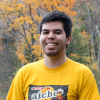
How Can I Keep from Singing?
Discovering my key to happiness
For me there is nothing more sublime than sharing one’s voice with fellow singers and creating beautiful chords and melodies. Singing has been among my favorite activities to take my mind off engineering and sequential thinking, and to explore my emotional and creative sides.
I have been singing since early high school, but when I transitioned to MIT, I was not sure what would happen to this hobby. Would I still have time to practice and perform? Would I find fun choirs and ensembles to join? Would I still have motivation to do this, despite the classwork and lab commitments?
Well, if the answer to these questions were no, this wouldn’t be a great post, would it? Clearly (spoiler alert!) I have made time to sing and perform during my time at MIT. This is important to me because, as the saying goes, “all work and no play make Jack a dull boy” – in my case, it makes a frustrated, stressed and mechanical German.
Who would want that? Not me! Also, by pursuing extracurricular activities I was able to go beyond the ChemE and research group bubble, to make new friends and to better connect with people with similar interests. So how did I manage to reconcile singing and work demands, while getting sleep and having a social life in the process?
Very carefully!
No surprises here, grad school is a very taxing experience. Classes are tough and producing good-quality research requires a lot of time. I won’t sugarcoat it or tell you “alternative facts” – grad school is demanding. My core classes were harder than my hardest undergraduate classes; I spent more than 20h/week doing homework and studying during my first semester at MIT. Once I joined a lab, the class workload went down but the research workload kicked in.
In lab I have always more work to do and ideas to pursue than there are time and manpower. Experiments fail and have to be repeated. Newly published papers have to be read. And to publish my own research I have to create figures, draft abstracts and manuscripts. So how did I avoid becoming that grad student who lives in lab and never sees the sun? By setting priorities.
Singing, sports, social life and sleep have no lesser value to me than doing research, so despite the academic constraints, I have always prioritized making time for myself and my hobbies. Rehearsals and performances find their place in my schedule just like research meetings do, and this prioritizing has led to some incredible experiences.
My first week at MIT at the first ChemE social, we were discussing our hobbies when a third-year grad student suggested I try out a grad student chamber ensemble she was a part of. They rehearsed Sunday evenings in Edgerton, so I said why not?
So I ended up joining the Grad Student Choir, and it has been a very rewarding experience, joining voices with musically-inclined graduate students from across campus. It is a chill and low time commitment group but we have performed a wide range of exciting pieces in front of friends and lab mates.
The second experience I want to share is performing with the Harvard Summer Chorus for the past two years. I went with four of my MIT friends (to have some familiar faces in the group, just in case) but we had a great time meeting people from the Harvard and Cambridge community, students, professionals and retirees alike. It was a heterogeneous group of people brought together by the love of choral music.
The highlight here, however, was performing Beethoven’s 9th symphony (last movement, Ode to Joy) at Copley Square with the H&H society (the oldest performing arts group in the US). If you are not familiar with it, you must look it up in YouTube (my favorite section starts around the 17-min mark) so you can understand how fulfilling and epic this experience was. I would say this was one of the more majestic moments of my life (second only to performing Prokofiev’s Alexander Nevsky Cantata the following summer).
Seriously, who would have thought that this would happen while at MIT?
I have discovered that the key to my happiness in grad school, and life I guess, is all about choices, priorities, and work-life balance. And whether you choose to do work exclusively, or you decide to value both work and extracurricular activities, MIT offers the best of both worlds.
I won’t tell you which choice is best, but I think the grass is greener on my side.
So despite the common belief that all you do in grad school is work, this doesn’t have to be the case. Keep in mind as you start graduate school, you should not give up your hobbies and interests to be a great scientist.
Share this post:
